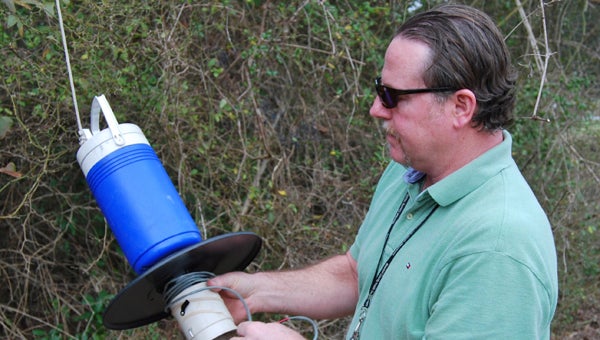Zika virus poses little threat in Beaufort County
Published 9:00 pm Friday, March 11, 2016

KEVIN SCOTT CUTLER | DAILY NEWS
MOSQUITO CONTROL: Eugene McRoy, an environmental health program specialist with the Beaufort County Health Department, tests a mosquito trap used to monitor population.
Eugene McRoy hangs a mosquito trap in a tree and checks to make sure the apparatus is working correctly.
McRoy, an environmental health program specialist with the Beaufort County Health Department, is making a trial run with equipment that will be dispersed throughout the county later this spring.
The traps will help keep track of mosquito population in the area. This year, those captured also will check for the presence of the Zika virus.
The state pared back mosquito surveillance and control programs in 2010, under former Gov. Bev Perdue. Funding to local health departments for the vector-control programs was eliminated by the General Assembly altogether under Gov. Pat McCrory in 2014. The Beaufort County Board of Commissioners, however, reached into county funds to continue local mosquito surveillance and control under McRoy, instead of letting the program fall by the wayside. It paid off after Hurricane Irene in 2011, when the mosquito population exploded — with some traps catching 15,000 mosquitos a night — and the county was responsible for getting it back under control, McRoy said.
“The county got reimbursed for all of it after Irene because we’ve got the program in place,” McRoy explained to commissioners at the March 7 board meeting. “The data was necessary for the county to get FEMA reimbursement after disasters like hurricanes.”
McRoy made a presentation at the board’s regularly scheduled meeting March 7—an update as to where the county stands with its program as well as information about public health concerns, like the Zika virus.
“Zika was discovered kind of by accident during some yellow fever studies in 1947 in Uganda,” McRoy said during an interview. “It was found in a monkey in the Zika Forest, so that’s how it got its name. It was one of those scientific curiosities; nothing ever came of it.”
But in 2007, an outbreak of the Zika virus was reported in Micronesia. Six years later cases were reported in French Polynesia, and by 2015 there was a substantial outbreak in Brazil.
“Attention has really come about over it and there are other cases in other areas,” McRoy said. “There have been several cases in the U.S. but they’re not locally acquired. They’ve been in people who traveled to other countries where there is a lot more of it going on.”
One case was reported in North Carolina, but the infected individual had been visiting out of the country, McRoy pointed out.
“We are used to looking for West Nile Virus and Eastern Equine Encephalitis,” he said. “With those, a mosquito won’t pick them up from an infected human and transmit them. With Zika, if a mosquito feeds on an infected human and becomes infected, it can bite another human and it can spread.”
Only one in five individuals infected with the virus will actually become ill, McRoy noted. Symptoms include fever, rash, red eyes, joint pain and headache. And there is no vaccine for Zika virus.
“Symptoms show up a few days to a week after someone is infected, but people don’t usually get sick enough to go to the hospital,” McRoy said. “The virus can remain in the blood of an infected individual for about a week, and it rarely results in death.”
There are concerns, however, that the Zika virus may cause birth defects after a rise in the number of babies being born in Brazil with microcephaly, a condition that causes an infant’s head to be smaller than normal.
“That’s not confirmed, but there is a strong correlation,” McRoy said. “They’re still studying that.”
There is little, if any, cause for panic, McRoy continued.
“With all that said, there are only two mosquitoes ever found in this area that are capable of transmitting this particular virus, and one of those has not been found in North Carolina since 1997,” he said. “So technically we just have that one mosquito, the Asian Tiger. That’s the one that breeds around the house in standing water.”
McRoy advised using the “tip and toss” method of mosquito control: tip water out of containers and toss unnecessary vessels that may gather water and serve as a breeding ground for mosquitoes.
Local residents interested in learning more about mosquito control and prevention are invited to attend a program hosted by the Beaufort County Health Department scheduled for May 3 from 6 to 7 p.m. For more information, call 252-946-6048 or visit the health department’s mosquito-tracking data at nchd.net/traps.php.





